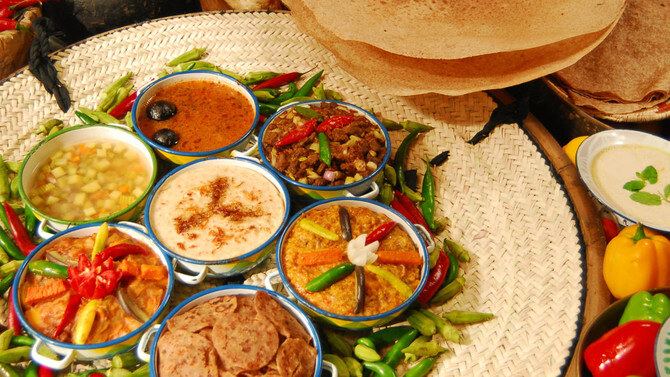Saudi Arabia is undergoing a major change in how its people think about food and health. What was once a land of rich traditional dishes and growing fast-food trends is now shifting toward a culture that cares more about health, wellness, and balanced living. This new direction is not just personal—it’s being encouraged by government initiatives, businesses, and social campaigns across the Kingdom.
But what’s behind this transformation? And are people really changing their habits, or just saying they are? Let’s dive deeper into the trends, challenges, and the future of food and health in Saudi Arabia.
The Health Crisis That Sparked a Wake-Up Call
Over the past decade, Saudi Arabia has been facing serious health problems linked to poor dietary habits. High rates of obesity, diabetes, and heart diseases have become common. In fact, studies show that nearly half of adult women and over a third of adult men in the country are obese. Diabetes also affects about 1 in 5 adults in the Kingdom. These numbers are not only alarming—they have become a national concern.

This health crisis didn’t happen overnight. As urban lifestyles grew busier, more people turned to fast food and processed snacks. Traditional meals rich in rice, bread, and meat continued to be popular, but portion sizes and food choices became less healthy. Combine that with low physical activity, and the result is a population struggling with diet-related illnesses.
What the Government Is Doing About It
Recognizing the long-term threat to public health, the Saudi government has stepped in with a series of strong measures. The Saudi Food and Drug Authority (SFDA), in line with Saudi Vision 2030, has launched campaigns and rules designed to reduce salt, sugar, and unhealthy fats in packaged foods.
For example, restaurants and cafes are now required to label food items that have high salt content. Items with more than five grams of salt must clearly show a “salt” label on their menus. This is a small but powerful step to help people make better decisions when eating out.
The SFDA’s Healthy Food Strategy also works with food manufacturers to reformulate products—cutting down on sugar in drinks, reducing sodium in canned foods, and banning harmful trans fats. These efforts are expected to improve the overall nutritional quality of food across the country.
The Role of Public Awareness
Government action alone isn’t enough. A big part of the health movement in Saudi Arabia is about changing public behavior—and that means changing minds.
Many people in the Kingdom believe they are eating healthy, but the numbers tell a different story. A recent national report on food and health revealed that 75% of Saudis still regularly eat fast food, even as they say they try to follow a healthy diet. Most people also get their physical activity from casual walking or light exercise, with very few sticking to regular fitness routines.
Reading food labels is another issue. Many consumers find it difficult to understand the information on packaging. This lack of clarity can lead to poor food choices, even when people want to eat better. So, while awareness is growing, there is still a gap between what people know and what they do.
The Growing Health and Wellness Industry
With more people starting to care about their health, businesses are taking notice. The health and wellness market in Saudi Arabia is booming. From healthy meal delivery services to organic food stores and fitness centers, the demand for wellness products is rising fast.
Experts predict that the health and wellness industry in the Kingdom could grow by nearly 10% every year for the next decade. This includes products like dietary supplements, health foods, fitness apps, and even mental wellness tools. Many of these businesses are being launched by young Saudi entrepreneurs who see health not just as a necessity but also as a lifestyle trend.
The foodservice industry is also adapting. Fast-casual dining options that offer fresh, clean meals are becoming more popular, especially in urban areas like Riyadh and Jeddah. These restaurants are mixing traditional flavors with healthy cooking methods, offering dishes that are both nutritious and culturally satisfying.
The Challenges Still Ahead
Despite all the progress, there are still major challenges to overcome. Many Saudi citizens continue to follow unhealthy eating patterns, with too much fried food, sugary drinks, and salty snacks. Research shows that most people do not meet daily recommendations for fruit and vegetable intake.
In one study, more than 30% of people reported eating fewer than three meals a day, often skipping breakfast and replacing meals with snacks. Around 74% said they snack regularly—often on foods that are high in calories but low in nutrition.
Even when healthier food options are available, they may not be affordable or easily accessible to everyone. This is especially true in rural areas where food choices can be limited. Some people also struggle to change habits due to cultural traditions or a lack of knowledge about nutrition.
Education: The Key to Long-Term Change
To truly change food culture, education is essential. That’s why the Public Health Authority, also known as Weqaya, has launched training programs to teach food safety and hygiene. These programs help restaurants, food handlers, and even home cooks understand the importance of proper nutrition.
Schools are also playing a role in promoting better eating habits. More programs now teach children about healthy food from a young age, and school cafeterias are starting to offer healthier meals. Educating kids early is one of the best ways to ensure future generations grow up with strong habits.

On a broader scale, nationwide health campaigns are being used to reach the general public. These campaigns focus on the dangers of obesity, the benefits of exercise, and how to make smart food choices. Many use social media to spread their messages, meeting young people where they are most active.
A Look Toward the Future
Saudi Arabia is at a turning point when it comes to food and health. The country has identified its challenges, and both the government and the public are working hard to build a healthier future.
This journey is not about giving up tradition—it’s about finding a balance. It’s about enjoying flavorful Saudi dishes while being mindful of ingredients. It’s about moving more, eating smart, and making wellness part of everyday life.
If the current momentum continues, the Kingdom could become a regional leader in health and wellness. With the right mix of policy, education, and innovation, Saudi Arabia is not just changing its plate—it’s changing its future.



